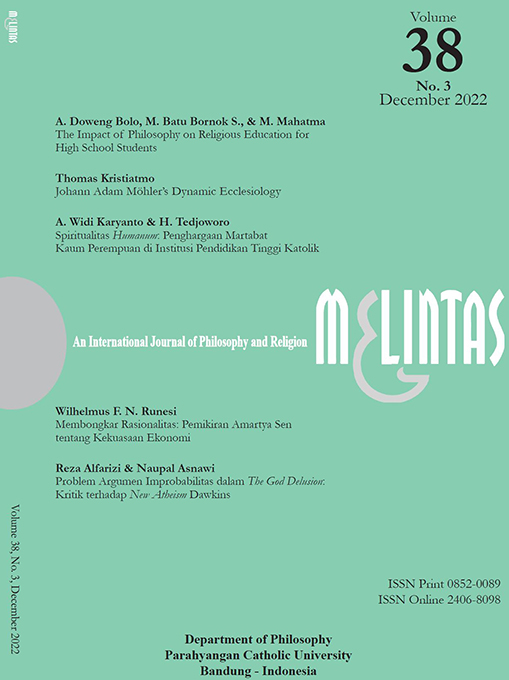Vol. 38 No. 3 (2022)

Rationality is like food that we swallow without realising whether it is delicious or even beneficial for us. Reading an academic journal automatically places our views and thoughts in a rigid rational framework. Is it true that rationality is overly presupposed in the academic world? The direct consequence is that irrational things are eliminated from our conversations. It is ironic that every day life is stripped of the very things that make it alive. The academic world seems to have to learn to be irrational in order to be more alive.
Let us reveal everything behind reasonable matters. Furthermore, let the texts question our ways of thinking and viewing. This edition of Melintas might bring us to a different path of academic journey. The first article examines the interrelation between religion and philosophy and measures how such interaction is embodied in religious subjects taught in middle-high schools in Indonesia. Three important characteristics are analysed, viz., the breadth of perspective about God, the openness towards other religions, and the willingness to embrace science in general. The second article sees how Möhler’s ecclesiology is influenced by romanticism without being too abstract. His ecclesiology is exemplary of a creative ecclesiology that can manage various tensions due to different ways of understanding the nature of the Church. The third article proposes a spirituality of humanum practised in a Catholic university as a framework for higher education to respect the dignity of women and men involved in the institution, so that all individuals in the campus are accepted as noble images of God. The fourth article tries to reveal the fallacy of rationality behind the policies used to implement power, which are promulgated by the government regarding economics in order to overcome various social and humanitarian problems such as poverty, hunger, and injustice in the society. The fifth article demonstrates the philosophical problems in Dawkins’ improbability argument, which reduces reality (ontology) based on subjective perception (epistemology), and thus obscuring the uniqueness of natural phenomenon and negating the existence of God. Alternative ethical perspectives regarding religion and God are proposed to address Dawkins’ accusations to religion as a source of evil and violence.
We may find that an academic journey is more of a continuous metanoia than simply satisfying the desire to think rationally. At the moment we want to eat food, first pay attention to whether we really want or need to eat it. Argument is food for our knowledge, and the strength of any argument lies in its openness to further refinement.
Editor.

